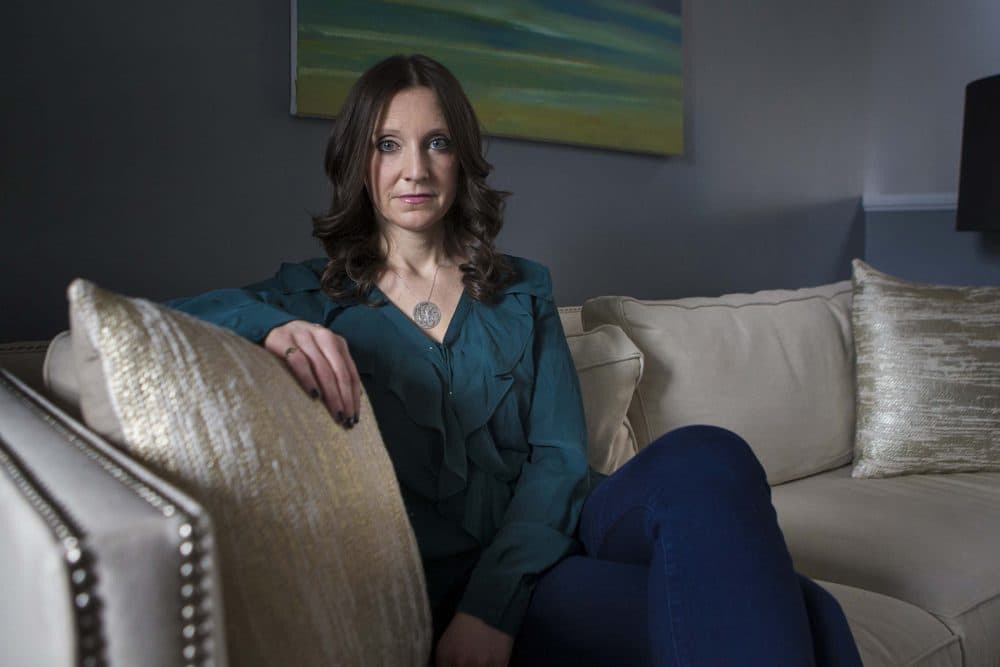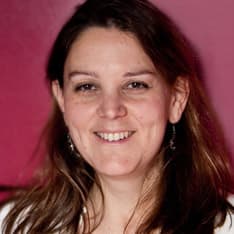Advertisement
This Moment In Cancer
As More Survive Cancer, These Doctors Try To Ease The Aftermath Of Treatment

Maggie Loucks was a week past her 28th birthday, and nearly done with her nurse practitioner training, when she was diagnosed with invasive breast cancer.
She underwent a lumpectomy. She had eggs harvested to protect her dream of one day becoming a mother. Three months of chemotherapy followed, and then radiation.
Now living in Boston's South End, Loucks recently finished five years of hormone therapy. It was a relief, of course. Her cancer treatment was finally over, and she could start to think again about having children. But it was also anxiety-provoking. There is now nothing more she can do to prevent the cancer from returning.
“I’m in this period of excitement and trepidation,” she says. “You feel this sense of euphoria and hope, and feeling at some point that you can put what you’ve been through behind you.”
Loucks is one of roughly 15 million American cancer survivors, with more than 1 million more joining their ranks every year.
“The number of survivors is growing in the United States and elsewhere, due to better early detection, better treatment and better long-term support of patients,” says Dr. Ann Partridge, director of the adult survivorship program at the Dana-Farber Cancer Institute in Boston, and Loucks' oncologist.
Survival is obviously the main goal for cancer patients. But the fact that so many are surviving years or even decades means providers need to think more about their quality of life after treatment, Partridge says.
She's part of a growing medical movement aimed at safely dialing back therapies where possible, and providing more mental and physical support for cancer survivors. According to its definition, cancer survivorship begins at the time of diagnosis, so even treatment is considered a survivorship issue, as are the long-term psychological and physical effects of the tumor and treatments.
Advertisement
Loucks, for instance, was able to skip two chemotherapy drugs given to patients just a few months ahead of her in treatment. A Dana-Farber study finished just before Loucks started therapy showed that women with her type of breast cancer fared just as well on one chemotherapy drug partnered with a targeted therapy, rather than a three-chemotherapy drug and targeted therapy cocktail. By skipping additional drugs, which are known to damage a woman’s fertility, Loucks can still hold out hope that she will be able to get pregnant without needing the embryos she and her husband froze six years ago.
Cancer Rehabilitation
There's no way to prevent all suffering from cancer treatment -- it’s always going to be rough. But health care providers can do more for their patients, says Dr. Julie Silver, director of cancer rehabilitation at Spaulding Rehabilitation Hospital and an associate professor at Harvard Medical School. “What I’m really getting at is not suffering, but preventable suffering,” she says.
More than a decade ago, Silver went through cancer treatment herself. Already a high-powered Harvard doctor with three young children, she felt great at the beginning of her treatment -- and absolutely awful by the end.
On her last day of chemotherapy, feeling sick and in terrible pain, Silver asked her doctor what came next. “He said to me, 'Someday, if you can, try to go back to work,' ” which was not exactly what the career mom wanted to hear. “I realized right then and there that what was missing was cancer rehabilitation -- something I, as a rehabilitation physician or physiatrist, do all the time.”
She started a company, which she has since sold, to bring rehabilitation services to cancer patients. Now she is designing a similar program at various locations affiliated with Spaulding.
People with cancer often have predictable physical symptoms, either before or after their treatment, she says. A stiff or immovable shoulder will make breast cancer therapy much more uncomfortable and sometimes even impossible, for example. Breast surgery, such as a lumpectomy or mastectomy, combined with removing lymph nodes from a woman’s armpit might make it painful to lift her arm high enough to brush her hair or pull on a shirt. Or she might roll onto that sensitive side of her body in the middle of the night, ruining her sleep and making therapy and recovery more difficult, Silver says.
“If we identify those [problems] early, sometimes we can even cure them right from the outset, and sometimes we can just minimize them, so that the woman is not left with a lot of pain and disability,” she says.
Instead of getting such “prehabilitation” or rehabilitation today, most cancer patients are simply told to exercise and maybe do some relaxation activities like yoga. Silver doesn’t think that’s enough.
“If someone had a stroke, we wouldn’t say to that person right away, you need to go out and take 10,000 steps a day and walk and do yoga,” she says. “Instead, we would evaluate that person for specific impairments and treat that person with a physical therapy, occupational therapy, speech therapy protocol that helped to mitigate or reduce the problems that he or she was having. Walking and yoga might be part of this prescription as well.”
Fear And Gratitude
As a palliative care specialist, Dr. James Tulsky has long focused on reducing the psychological and social toll of cancer treatment.
Tulsky, chair of the department of psychosocial oncology and palliative care at Dana-Farber and Brigham and Women’s Hospital, says his biggest challenge is getting patients the support they need. Even in a place like Dana-Farber, which has extensive resources and caring professionals, some patients need more than the institution can provide.
For many patients, the biggest issue they carry into their survivorship is fear.
He mentions a relatively young patient of his who has metastatic lung cancer and a young child. She’s also her family’s primary breadwinner. So, instead of spending her final months with her child, the woman is working a grueling desk job to support her family. “When I see her physical condition, it’s scary,” Tulsky says, explaining that she has terrible neck pain. “I can’t tell her to not work and lose that income, because she needs that money. I completely understand her choice, but to me it’s tragic.”
For many patients, the biggest issue they carry into their survivorship is fear, Tulsky says.
It’s tough to truly reassure a cancer survivor, because there is always some risk -- however small -- that their cancer could come back, or a new one develop. One quarter of newly diagnosed cancer patients over age 65, and 11 percent of younger patients, have had cancer before, according to a new study.
So Tulsky tries to help patients reframe their understanding of risk, distinguishing between realistic concerns and unhelpful, catastrophic thinking.
“The key challenge for patients after they’ve been diagnosed and treated is living with uncertainty and living with the potential fear -- and that’s hard,” he says.
Sometimes, patients cope with their cancer by reframing it into a positive experience. Tulsky says he would never tell a newly diagnosed patient that they’ll be grateful for their cancer some day. And yet, many patients say they see the world differently -- and better -- after cancer.
“I’ve had patients say they look outside, they see flowers, they see the street, they see other people, and they appreciate things so much more, because they took things for granted,” Tulsky says. “I think that’s a wonderful way of coping.”
That’s certainly how Loucks views her cancer now. Of course it was horrible, but looking from the other side of it, she’s grateful for the experience. It gave her a new appreciation for life. A sense of gratitude. And she and her husband gained five child-free years together that they wouldn’t have had if her hormone therapy hadn’t forced them to defer parenthood.
Loucks, who recently switched her nursing focus from oncology to adolescent medicine, says she carries terrible survivor guilt. But she won’t allow herself to go down the “dark rabbit hole of fear,” preferring to focus on the positive aspects of her survival.
“That’s just kind of how I’ve always been,” she says. “I just feel like it’s easier to go through the day with a smile on your face than a frown.”
This segment aired on January 12, 2018.
